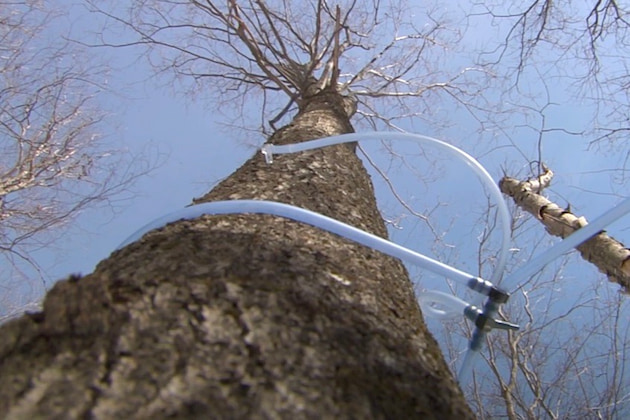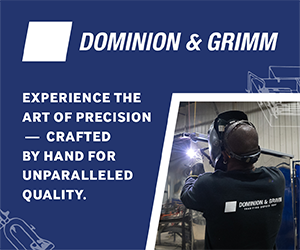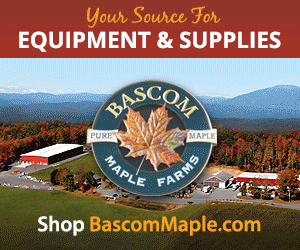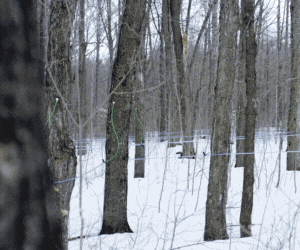Sugarbush Management
Experts say leasing 5,000 taps or more is the best option to make money in this business
UVM Extension offers tips on picking the best woods for tapping
By PAUL POST | MAY 14, 2021
MORRISVILLE, Vt.—Sugarmakers with 5,000 or more taps are two times more likely to be economically viable, and most of them rent or lease some sugarbush to achieve higher production levels.
But many things must be considered before reaching an agreement with landowners such as location, rental rates and anticipated yield.
Industry experts from Vermont, the nation's leading maple state, discussed such issues during a recent online program presented by The University of Vermont Extension Service.
"Location matters," said Mark Isselhardt, Extension maple specialist. "Not every sugarbush is going to be equal. There are a lot similarities between real estate and the sugarbush you want to rent. If you think of location as being one of the most critical aspects of real estate valuation, it's very true for sugarbushes as well."
Ideally, the desired site would be close to an existing maple operation.
Regardless, road access and electrical power are both critically important.
A particular parcel you want to lease is going to be more or less attractive based on its ability to run a decent vacuum system, or your ability to get into the woods and get the sap out," Isselhardt said. "Are woods roads decent? Can you get in and out to maintain high yield."
Producers should also carefully evaluate the forest.
"What's growing there? What's the potential for that particular parcel to produce sap?" he said. "It's more attractive in general to a find well-stocked, higher average diameter sugarbush than trying to piece it together with lots of smaller sugarbushes."
In addition, ask if there's a forest management plan.
"Is there an inventory?" Isselhardt asked. "Do you know what trees are available and can you get a reliable estimate on the number of taps in those trees? That's going to put you in a better position in terms of deciding how much to pay."
Quite simply, know what's there.
"Are there adequate woods road water diversion structures or are you going to have to put all that in? Those costs are going to reduce the viability of any parcel you're going to rent."
In addition to each of these site factors, a number of non-site factors also come into play such as length of lease, land ownership stability and forest management restrictions.
Most leases in Vermont are for 10 years.
A site that's never been tapped before will involve considerable investment to set up tubing, especially when hiring an installer for the job. Spouts are typically replaced every one to two years; along with drop, lateral and main lines about every five, 10 and 15 years, respectively.
"What's your estimated yield going to be to pay off that tubing investment? You need to factor that in," Isselhardt said.
Before deciding how much to spend, producers should also try to get an idea about whether the land will change hands or stay with the current owner. Because a new owner might be more difficult to work with, require higher rental rates, or not even want to lease land.
Cannella, an Extension associate professor, discussed the benefits of buying versus renting sugarbush, and provided valuable information about navigating relationships with landowners and setting rental rates.
Buying versus renting typically includes conversations about cash flow, access to cash, access to credit and potential borrowing.
In a case study involving 1,000 taps on 18 acres, the total 10-year cost of buying land would be $22,910 compared to $10,000 if renting. But the owner would have an $18,000 asset while the renter has nothing.
"I don't think there's a right or wrong here," Cannella said. "People have different reasons for ownership versus rental, different reasons for managing operating expenses."
He encouraged people to consider their cash flow needs and their desired trajectory for net worth accumulation over time and whether that's a goal for the individual or business.
In rental agreements, cash payments are of obvious interest to both parties.
The owner naturally welcomes extra revenue.
"If you're an operator you want to make sure you're paying the right rate on an annual basis, however the payments are structured," Cannella said.
Surveys taken in 2017 and '19 found that most producers who rent sugarbush are paying from 50 cents to $1.24 per tap.
However, adjustable rental rates can also be reached. This mediates the producer's risk if there's a crop failure during an exceptionally poor year, or increases the landowner's share of profits if market prices spike.
Alternative rental structures might also be agreed to. The producer, for example, may give the landowner a gallon of syrup for every 100 taps; or he could pay $1 per tap plus a performance bonus; or simply give the landowner 10 percent of all syrup produced.
And there are other ways to pay landowners other than cash. For example, a producer might do excavation work for the property owner or reach some other type of bartering arrangement.
Isselhardt pointed out that competition from other producers is one of the biggest drivers for setting rental agreement price points.
"If you're in an area where there are more producers who also have capacity and are looking to buy into a stand and lease those taps, it's naturally going to drive up the price," he said. "Just like nice property on the lake is desirable, more people are willing to pay for it. You have to understand where you are and how competitive that area is."
There can even be significant differences within small states such as Vermont. Franklin County, which borders Canada in the northwest corner of the state, is Vermont's leading maple producer and a highly competitive area for leases.
"It's not unheard of to have rental rates of $1.50 to $2 per tap whereas you wouldn't see that in counties that don't have quite as much competition," Isselhardt said. "That's a function of capacity and producers able to haul sap who are willing to pay that higher rate."
Randolph, Vt.-based attorney Annette Higby, who specializes in farmland leasing and land tenure issues, urged producers to put every lease agreement in writing, which is required by state law in Vermont for any real estate deal longer than a year in duration.
"If you're not in Vermont you should check your own Statute of Frauds, it might be different," she said.
Putting things in writing prevents misunderstandings and provides something that can be enforced to ensure security of tenure so the producer gets a return on investment for all of the structure and work they're putting into a sugarbush.
The lessor and lessee should sit down, talk about what they want in their lease and have it reviewed by an attorney. There should be a description of the premises including a copy of the deed; a listing of improvements producers make to the property; insurance documents; and financial terms of the lease/rental pact.
"It just makes sense," Higby said.
































